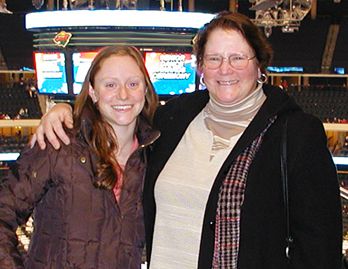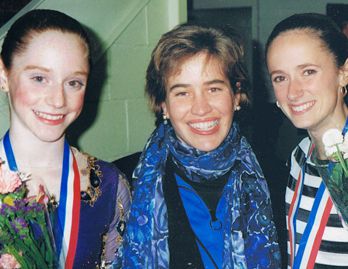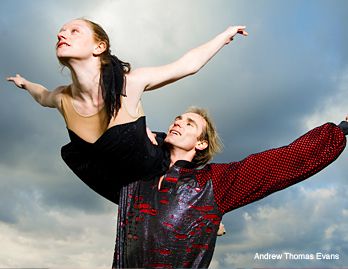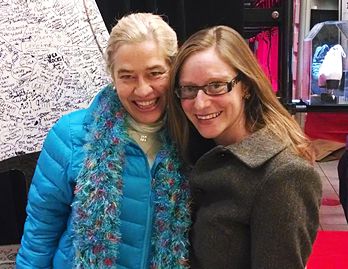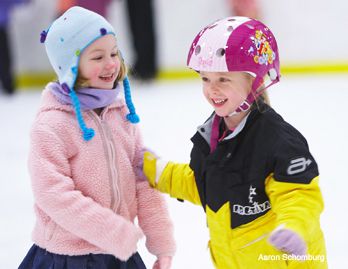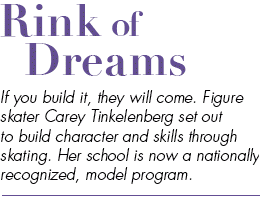
Smack.
My leather boot collides once again with the unforgiving ice surface of Colonial Figure Skating Club’s rink 2 at 7 o’clock on a Wednesday morning. I emit a discouraged groan as I hoist myself to my feet, one skate at a time, to attempt a final triple salchow before heading to Concord in time for AP Biology.
Thus begins Carey Tinkelenberg’s essay for her application to Carleton College. As the world turns its attention to the Sochi Winter Olympics, similar images come to mind of young athletes, dedicated to perfecting their skills. Yet unlike competitors who focus on their sports to the exclusion of all else, Carey maintains a healthy, balanced perspective. She recognizes that, beyond the short lifespan of a skating career, an entire lifetime awaits.
With that perspective, she launches Northfield Skating School in 2005 with the motto, “Building skills and confidence for skating and life.” From an initial season of 35 students, the school grows exponentially. Parents such as Suzi Scott and Cindy Penny appreciate the positive environment for their kids. They see Carey not just as a PSA master-rated coach, but as a role model with unpretentious core values. Both of them use the same phrase: “She walks the walk.”
In its nine years, the school has become a nationally recognized, model program, run by a staff of 14 people. The U.S. Figure Skating Association takes notice of Carey’s work and invites her to give presentations at USFS conferences. She also writes its Basic Skills Program Director’s Handbook. Recently, she begins coordinating classes with the Northfield Public Schools Community Services Division and wins the Making A Difference Award from the Northfield Healthy Community Initiative for having a positive impact on youth.
Her emphasis on developing the entire person reflects her own upbringing and training. “We wanted her to skate and love it and be happy,” says her mother, Kathy. “The only thing we told her was that education comes first.”
Not only does Carey excel at elite Concord Academy near Boston, but she chooses to attend Carleton, a small liberal arts college in remote Northfield, Minnesota. It’s a far cry from Harvard, Massachusetts, where she grew up surrounded by apple orchards, rolling hills and conservation land. When they first visit the area for Prospective Students Weekend, she asks Kathy, “Where are the trees?”
Carey skated a flawless program and won silver at the 1998 New England Regional Championships.
She doesn’t ask where the skating club and school are. Northfield has neither, but she doesn’t plan to compete after high school anyway. She sees Northfield as a four-year adventure, after which she’d return to eastern Massachusetts.
After majoring in psychology, she begins working full-time in a psych lab with one of her college professors. She also has a part-time job at Goodbye Blue Monday, a coffeehouse and quintessential community hangout. Carey spent countless hours studying in that cozy space. It’s the kind of environment where one’s mind drifts to moments in the past and goals for the future.
She thinks back to her first steps on a pond in the Delaney Conservation Area near her Massachusetts home. In an adorable pink snowsuit, she wobbles joyously on the ice, while her dad chases her around with a video camera. That sense of “feeling good on the ice” stays with her.
At age seven, she begins taking group lessons at a local rink. Kate Wilkins McManus is teaching one of the group classes when the program director asks her to see a kid jump. “Carey!” yells the director. A tiny girl in leggings, oversized sweatshirt and long red hair turns around and smiles broadly. “There’s no way this tiny little girl can jump, I thought,” says Kate. “But it was so huge and so beautiful. My jaw just dropped.”
After six months of group lessons, Kathy asks Kate to coach Carey privately. They work together for the next decade, a rarity in a sport where skaters change coaches often. Along the way, Carey develops a team of three, with Mark Mitchell and Peter Johansson also acting as influential role models and mentors.
By age nine, Carey starts competing in skating events. She is initially so nervous that she throws up in trash cans at the venues. In time, she develops strategies to manage her stage fright. Her dad builds a rack that extends across her bedroom wall to hold all the medals she accumulates. Her mom makes all her skating outfits. An aspiring jewelry designer, Kathy draws inspiration from Brighton Collectibles and sews beads and crystals onto some of Carey’s dresses. Kate demands excellence, but emphasizes the joy of the process rather than the outcome.
Carey and Peter Biver won silver in Masters Pairs at the 2010 Adult Figure Skating Championships.
“Katie taught me about aesthetic lines, about communicating and escaping through movement, about the parts of skating you don’t see diagrammed in the US Figure Skating rulebook,” Carey writes in one of her many school essays about Kate. “She gave me the capacity to value and understand what can exist on the ice beyond the jumps and the spins. Katie awoke the artist in me.”
For both Carey as a skater and Kate as a coach, the 1998 New England Regional Championships remains the highlight of their careers. Carey tears up thinking about that moment, when she gets into the “flow” and completes every element of her long program flawlessly. A former New England champion herself, Kate watches with her heart in her throat, jumping every jump with Carey. When she extends her left toepick into the ice to end the program, Carey feels a rush of electricity and pride. It’s the first time she exceeds her own expectations. She steps off the ice and throws herself into Kate’s arms, nearly toppling them both over.
Putting education first, she twice turns down opportunities to join Disney on Ice to stay in school. After graduation, despite having her two jobs, she begins musing about starting a skating program on Sunday afternoons. A hockey association dominates the town rink. Carey doesn’t know whether there would be great interest in figure skating. Yet she has a feeling that if she builds it, they will come.
Her bosses at Goodbye Blue Monday support her desire to start her own business and help her plan it. Her drive, focus and resilience – all the qualities that help her land her triple salchow – enable her to become an “accidental entrepreneur” at age 22.
On the first day of classes, her mom flies out to help at the front table. As Carey steps out onto the ice to look around and obsess over every detail, she has the same feeling she had after her flawless New England program. That sense of pride at setting a goal and accomplishing it well applies to all endeavors.
Her goals for the next decade include starting a family and expanding her leadership consulting to include organizations as well as individuals. If there were an Olympic sport in leading a life well lived, maybe she would medal in it. 



